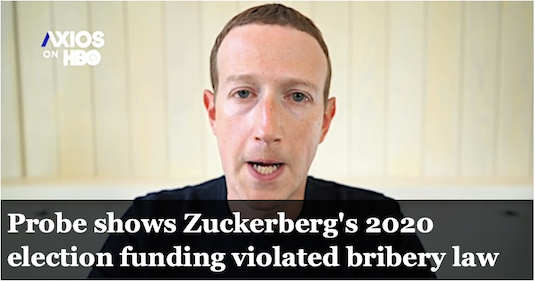Topic: The ConWeb
 When a Republican-generated report in Wisconsin called for overturning the 2020 presidential election because a foundation funded by Facebook's Mark Zuckerberg donated money to help finance putting on elections, some of which went to get-out-the-vote efforts, the usual ConWeb suspects -- and even some unusual ones -- embraced it. Of the former, Bob Unruh gushed in a March 1 WorldNetDaily article:
When a Republican-generated report in Wisconsin called for overturning the 2020 presidential election because a foundation funded by Facebook's Mark Zuckerberg donated money to help finance putting on elections, some of which went to get-out-the-vote efforts, the usual ConWeb suspects -- and even some unusual ones -- embraced it. Of the former, Bob Unruh gushed in a March 1 WorldNetDaily article:
It's already been confirmed by a study that Mark Zuckerberg's decision to donate some $420 million to various leftist elections officials across America to "help" them accommodate COVID during the 2020 president race essentially "bought" the vote for Joe Biden.
Now a report from the Office of Special Counsel in the state of Wisconsin has determined that those actions also violated the state's bribery statutes.
Margot Cleveland at the Federalist has posted an explanation of the stunning verdict.
In Wisconsin, Zuckerberg's money, some $9 million, went "solely to five Democratic strongholds" and the special counsel's report to the Wisconsin Assembly said those actions violated the ban on bribes.
[...]
The report, 136 pages, said it was not challenging the certification of the 2020 results in Wisconsin, one of several battleground states that went narrowly for Joe Biden. Its goal, instead, is to recommend ways to avoid another election that results from criminal activity.
Unruh is lying. The author of the report, Michael Gableman, argued in a hearing discussing the report that the Wisconsin legislature "ought to take a very hard look at the option of decertification of the 2020 Wisconsin presidential election," and the report itself offered instructions on how it thinks that can be done.
Unruh then highlighted the report's key claim that money went to the apparently horrible offense to encouraging people to vote:
The Federalist reported, "According to the report, Priscilla Chan and Mark Zuckerberg providing financing that allowed the Center for Tech and Civic Life to offer nearly $9 million in 'Zuck Bucks' to Milwaukee, Madison, Racine, Kenosha and Green Bay counties. In exchange, the 'Zuckerberg 5,' as the report called the counties, in effect, operated Democratic get-out-the-vote efforts. Those grant funds then paid for illegal drop boxes to be placed in Democratic voting strongholds."
But as the Washington Post's Philip Bump noted, the report's idea that it's somehow "cheating" or even illegal to encourage people to vote -- particiluarly if those people voted for a candidate opposed by the report's author -- is dumb:
Well, if you want to increase turnout among less frequent voters, you’re going to target groups that turn out less often, which, given the change from 2012 to 2016, means focusing on counties that have more non-White voters to turnout. In Wisconsin, that means counties such as Milwaukee, Racine, Kenosha, Dane, Sawyer, Brown, Ashland and Rock. Each of those counties has a non-White population that makes up at least a fifth of the population. Understandably, then, an effort to bolster election access in Wisconsin focused on the cities of Milwaukee, Madison, Racine, Kenosha and Green Bay — in Milwaukee, Dane, Racine, Kenosha and Brown counties.
Would increasing turnout among low-propensity voters in those places probably increase the number of Biden voters? Yes. Is that cheating? Of course not. These efforts aren’t suppression of White turnout or giving non-White voters some sort of unfair leg up. Instead, they’re efforts to reduce the barriers that cause poorer, non-White citizens to vote less often.
That’s not how Gableman frames the efforts. His report is blatantly obvious in its efforts to imply wrongdoing. ... The “Zuckerberg 5” sounds like a domestic terror cell from the 1960s, which is the goal.
Bump went on to note that Gableman portrayed efforts to increase turnout as an inherently partisan Democreatic effort, even though turnout for Trump increased as well, and that turnout for Democrats was up nationally, not just in Wisconsin. Bump also pointed out that Gableman's effort to portray money to municipalities to help increase turnout as "bribery" has already been rejected as a valid legal theory. Bump concluded:
Here again, nearly 500 days after the 2020 election, we see a familiar pattern play out. Republican elected officials want to make Trump supporters happy by treating their unfounded claims of fraud as serious rather than actually confronting those claims. They hire an investigator who is starting from the conclusion that votes were stolen, here. Then the investigation serves as a giant, costly smoke machine so that the investigator can tell the legislators and Republican voters that, while you can’t see it, somewhere in that cloud is a raging fire.
In this case, that fire consists of trying to increase voting among those who have historically faced institutional difficulties in doing so. If that’s cheating, then so is offering SAT tutoring to students in disadvantaged school districts. Sorry if that expands the pool of Harvard applicants your kid is competing against.
Unlike Unruh, a March 1 Newsmax article by Brian Freeman admitted that Gableman wants to overturn the eleciton, and he also included comments from the Democratic head of the Wisconsin Election Commission, which Gableman wants tio eliminate, callingthe report "full in crazy conspiracy theory."
CNSNews.com, meanwhile, publishsed a March 3 column by the Family Research Council's Tony Perkins ranting how Gableman's report exposed "bad actors" (the "bad act," of course, was to boost voter turnout), then had to parse exactly what was bad about that:
To be clear, the report does not allege widespread voter fraud. There was no violation of the "one citizen, one vote" principle. What the report does show is a well-funded effort by government-run election boards to systematically turn out more votes in regions known to lean towards one political party. Political parties and candidates are allowed to do this; in fact, GOTV efforts are essential parts of every modern political campaign. What is illegal here is that election administrators put their thumb on the scale for one political party. In the words of the report, they "crossed the line between election administration and campaigning."
[...]
How many votes can you buy with $350 million? Possibly enough to swing a close election. But to know for certain, we would have to prove how many votes would not have been cast if the money had not been spent, and that's impossible. The money was spent unfairly, but this is one wrong that can't be righted retroactively -- at least, not by human judges.
Perkins' idea of "unfair," of course, is turning out voters who might vote for a candidate Perkins doesn't apporove of.
Given what a ridiculous, misleading, conspiracy-laden report it is, it's surprising that the Media Research Center embraced -- though perhaps not so surprising, given how long the MRC has been trying and failing to attack Facebook. A March 2 post by Alexander Hall -- complete with the headline "Zuck Bucks!" -- was in full spin mode, right down to uncritically repeating a description of Gableman's piece of work as an "election integrity report":
An election integrity probe reportedly found that a nonprofit funded by Facebook founder and CEO Mark Zuckerberg swayed the 2020 election “in violation of Wisconsin law.”
Could this be the scandal that shakes up America’s electoral integrity? “A 2020 election integrity probe in Wisconsin reported findings Tuesday that a nonprofit group funded by Facebook founder Mark Zuckerberg committed election bribery when it targeted $8.8 million in get-out-the-vote funds to five heavily Democratic jurisdictions,” The Washington Times reported March 2.“The report details a ‘bribery scheme’ implemented by the Chicago-based Center for Tech and Civic Life, a liberal voter advocacy group heavily funded by Mr. Zuckerberg.”
[...]
The report’s findings, if true, implicate that “Election officials in the five jurisdictions, the report found, may have broken the law ‘by not treating all voters the same in the same election … a bedrock of principle of election law.’”
Hall has no idea if the claims are true because he made no effort to investigate it -- and neither did the article he cited. Hall conveniently chose a Washington Times article to summarize because it's a right-wing publication that can be counted on to offer conservative-friendly spin; the article includes only two paragraphs of criticism of the report buried toward the end, neither of which was substantive.
But that's what happens because the MRC cares less about being authoritative and much more about owning the libs through any means necessary, no matter how discredited and WND-esque they are.








